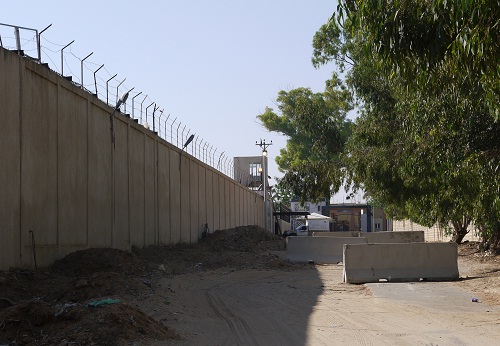By George Grant.
Tripoli, 20 June:
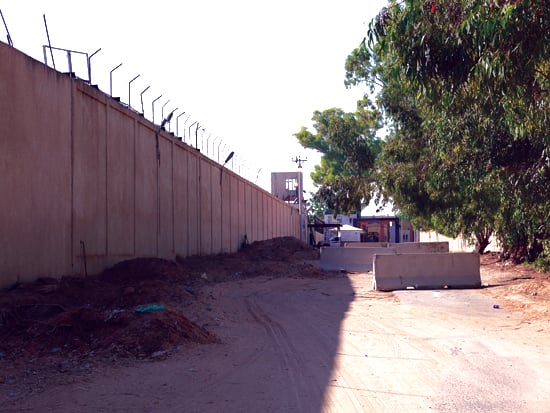
Sitting under umbrellas coloured in Libya’s revolutionary flag, small groups of visitors can be found chatting to . . .[restrict]their relatives on what must qualify as the country’s greenest lawn.
Nearby, a sizeable new doctor’s clinic is under construction, with the marble floors and surfaces being put in place. There is a kitchen here also, impressively clean, and well stocked with baked goods, drinks and frozen food.
Ain Zara prison is certainly a place that confounds expectations. Under Qaddafi, this facility on the outskirts of Tripoli was home to thousands of political prisoners, many of whom were tortured and murdered within its high walls. Since Qaddafi’s overthrow last October, the prison’s reputation for detainee mistreatment hasn’t gone away.
Last month, allegations of ongoing prisoner abuse appeared in a number of Libyan news outlets, including the Libya Herald. It was claimed that a number of inmates had been beaten with metal rods, thrown in sewage water and forced to strip off their clothes. The allegations were made by some family members of the detainees, with the incident subsequently being investigated by Amnesty International.
Amnesty concluded that the incident, which took place on 14 May, involved 20 prisoners who were beaten extensively by prison guards to the point that some lost consciousness. Their report said that the prison authorities had condemned the severity of the beatings, but claimed they were a reaction to the discovery of illegal drugs and knives in the cells, as well as the detainees’ violent behaviour towards the guards.
Such occurances inevitably make headlines, and rightly so, but they also tend to ignore the day-to-day realities of life in what remains one of Libya’s most notorious prisons. Having been granted access to the facility by the Ministry of Justice, the Libya Herald found Ain Zara to be an altogether more complicated and intriguing place.
For the most part, the prison cells are overcrowded, but hygenic, with perhaps 10-17 men housed in each. At no point during the visit can the smell of human odour, still less of excrement, be detected, and each of the cells contains its own loo and shower. Wet and drying laundry is strung out across the cell bars, and the prisoners occupy themselves with talking, reading or watching the television.
Once a week, they are allowed outside to play football, and there are also visits to the prison’s cafe and shop, as well as to the Mosque on Fridays. Prayer rooms are also here, used both for their intended purpose and as a place where some prisoners are teaching others to read.
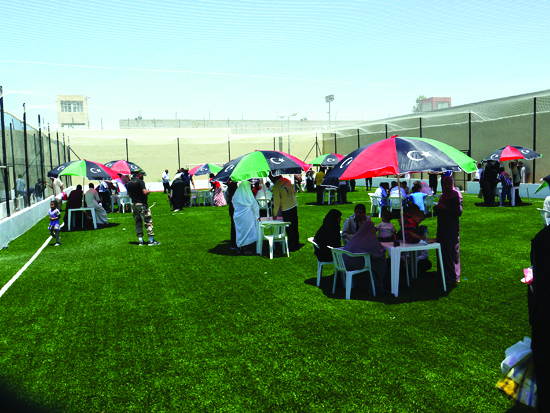
“I’m not saying it’s perfect, but things are moving forwards here all the time”, says Andy Barclay, a projects director at the International Centre for Prison Studies (ICPS). “When we first came in February the prison was still under the control of the Tripoli revolutionary brigade, and we weren’t allowed in. In April, the militia were still holding the keys to the gate, but today the badge on the arm is that of the judicial police”.
Standing on the first floor of what is known as the Tower, where a large number of suspected Qaddafi loyalists are being held, Barclay points out some other tell-tale signs useful for comprehending conditions at Ain Zara. “Stand and listen”, he says. “These prisoners are lively. They’re talking amongst themselves and to the guards. On previous visits, things were much more subdued, and that’s when you need to worry. There’s less fear here now.
“Also, I’ve yet to hear a single complaint about the food, which always tells you something! The kitchens here are excellent”.
When I ask a number of the prisoners in the Tower about their conditions, all say they are now being well treated, or at least none admit to any mistreatment. With a guard standing over their shoulder whilst they speak, establishing the truth of such claims is always going to be difficult.
Nevertheless, the overall conditions of the prison, combined with the surprisingly positive attitudes of most of the inmates, do not suggest that this is a place where prisoner mistreatment is a common occurrence. The most serious recent injury I come across belongs to a prisoner who sprained his ankle whilst playing football, although one man tells me of mistreatment that took place in February before the facility was transferred to full Ministry of Justice control.
“I was beaten on my shins and feet”, he says, showing me the faded marks. “This hasn’t happened again since then”. Two other prisoners spoke of injuries received last October, at the very end of the revolution, although they said that neither was inflicted at Ain Zara.
In fact, overwhelmingly the most common complaint made by the inmates here does not concern the conditions at the prison, but the fact that they are behind bars at all.
“I never fought for Qaddafi”, insists one. “Yes, I was with the regime forces, but I never fired my Kalashnikov. It’s still brand new”. Another tells me he is being held “on suspicion of spying against the revolutionaries”, although he too insists he did not fight with the old regime.
One of the prisoners is more forthcoming: “I joined Qaddafi’s forces because I wanted to kill the English, the Americans and the Jews!” he shouts. “I did not want these people occupying Libya”.
As an Englishman in Libya, and thus apparently one of his intended targets, I ask him if he believes his country has indeed been occupied now that Qaddafi has been defeated. “No, I don’t think that”, he admits, “but I do not deserve to be in this prison. Six million Libyans supported Qaddafi before the revolution, so why are they picking on me now?”
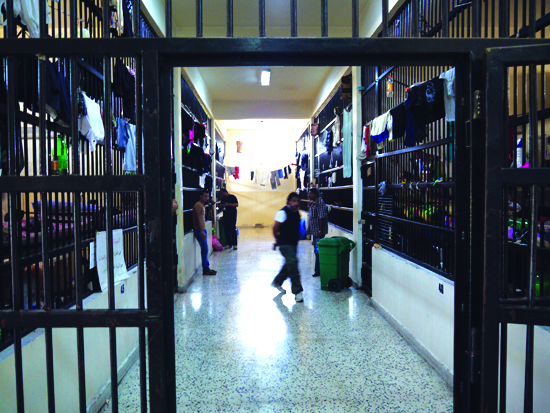
At this point, loud shouting breaks out from a cell further down the corridor. An older man is protesting his innocence and demanding to be released, whilst the prison’s deputy director attempts to calm him down. “He’s handling the situation well”, Barclay says of the deputy director. “He’s not backing down, but nor is he being aggressive. He’s listening.” As the deputy director brings the agitated prisoner out of his cell, Barclay reveals that the spat has a peculiar and untimely irony to it: “This prisoner is actually due to be released later today without charge, but he obviously hasn’t been told yet!”
The prisoner in question is by no means the first to be released from Ain Zara when insufficient evidence exists to bring a charge. According to the prison’s director, Mohammed Mustafa Anami, more than 1,000 detainees have been released this way since the prison was officially transferred to the Ministry of Justice (MoJ) on 17 February 2012, the first anniversary of the revolution. “If insufficient evidence exists to bring charges against any prisoner then we release them, Qaddafi loyalist or not. That is the principle”, Anami says.
“We had 1,400 prisoners in Ain Zara at one point”, he goes on, “but as of Sunday 17 June, there are 746 prisoners here.” Anami then proceeds to break that number down, telling us that 477 prisoners are in the Tower, almost all of them suspected Qaddafi loyalists. There are also 213 men in what used to be the semi-open section of the prison, which – due to overcrowding – is now being used to house serious offenders, a number of them former revolutionaries.
“We keep the revolutionaries and the Qaddafi people in separate places for obvious reasons”, Anami says.
There are also 53 prisoners in the much more spacious and newly refurbished surrounds of the old Italian section of the prison. “This place we reserve for prisoners who have behaved well, and conditions are much better there. We use it to incentivise the others”, Anami explains”. Three inmates are also currently in the prison clinic.
From behind the large desk in his immaculately ordered office, Anami passes over a stamped and dated sheet of paper verifying the figures. He also produces a bound inventory of all the prisoners to have passed through Ain Zara since it was handed over to the MoJ. “That the prison now has such an inventory demonstrates major progress”, says Alistair Bailey, an associate at the ICPS. “It’s an impressive document. It shows communication, order, structure and good management. This is a prison that now knows what needs to be done”.
This is not to say that Ain Zara’s transition from a brigade-run detention centre to a fully-ordered MoJ facility is complete. The prison is supposed to be under civilian control, but the young man in uniform standing rigidly to Anami’s left, as well as the prison’s deputy director, who more closely resembles a regimental sergeant major than a government civil servant, belie the fact that this point has not been arrived at yet.
Much more troubling is of course the alleged incident of 14 May, which hangs like a black cloud over Ain Zara’s reputation. I take the opportunity to request of the management that they give me their version of events. This account corresponds to the one provided by Amnesty International in many respects, although there are also important differences. The prison authorities allege that just 13 men were involved, as against Amnesty’s 20, and they also give much more of the background and context.
The man who offers to explain is Ashraf Zaid, who is in charge of prisoner mental and physical wellbeing at Ain Zara. Like so many others in post-revolutionary Libya, Zaid is a man who finds himself in his job by virtue of events as opposed to past experience. A graduate of psychology from Tripoli University, he was part of a children’s clothing import business before last year’s uprising.
“This incident primarily involved just four prisoners, all of them revolutionaries”, he begins. “Earlier on that day, these men were sent to the prosecutor’s office in Tripoli, where prisoners go to be investigated and hear the charges against them.
“Whilst there, they managed to obtain drugs, including pills, syringes and hashish, as well as a knife. Some of the drugs were sealed inside the fingers of surgical gloves, which they swallowed to smuggle into the prison, presumably to be vomited or excreted out later. We believe they were given these things by friends and relatives, who sometimes visit detainees whilst at the prosecutor’s office.”
When asked how the prison authorities discovered the contraband, Zaid says they were tipped off by one of the other prisoners who witnessed the incident. “Here that is not so strange”, Zaid explains. “People may have religious or other reasons for not liking this kind of thing.”
Upon the prisoners’ return, they were searched, and the illegal substances confiscated. To substantiate this account, Zaid then signals to one of the guards, who proceeds to bring in a number of sealed and marked packages, which contain what he alleges to be the contraband in question. At this point, he also takes the opportunity to show me some of the other more ingenious methods prisoners have used to smuggle drugs into Ain Zara, which include stowing them in the soles of sandals and trainers, and putting them inside a mobile phone charger.
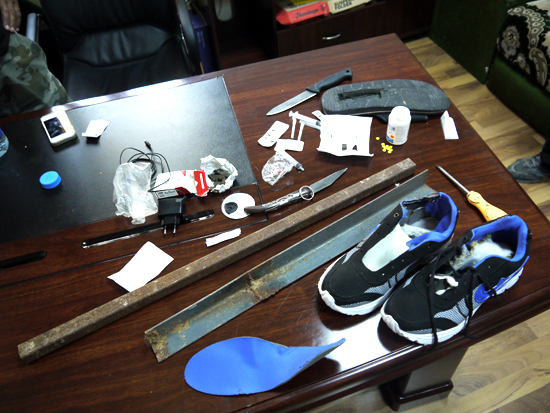
“The problem is, we believe they had already taken some of the drugs whilst outside the prison”, interjects the deputy director, Ziyad Anami. “Not only that, but as former revolutionaries, they felt their presence in this prison at all was unjustified. But you should know, one of the four has a previous conviction for murder. Soon afterwards, they started shouting and banging on the doors. When the guards went into the cells, the fighting started, and nine other prisoners got involved. One of the prisoners even used a metal bar from one of the beds to attack us. Obviously, the guards fought back”.
Anami admits the prisoners were beaten, and that his men had used rubber hoses and batons. “We had to be strong to send a message to the other prisoners that this kind of thing would not be tolerated”, he says. “In Aljdiada [another prison in Tripoli], one of the guards was killed in rioting, and we cannot have that here”. Anami says the beaten prisoners were subsequently treated in the prison clinic, but concedes that the guards may have gone too far. He says the prison authorities investigated the incident, and one of the guards may now face charges.
“Unfortunately, these prisons have a real problem in that many of the guards have not been properly trained, and lack the necessary equipment to deal with this kind of thing”, Barclay subsequently explains. “Consequently, when trouble like this starts, it can be quite frightening for the guards, and they go in heavy. Under Qaddafi there wasn’t so much of a problem because all the prisoners were terrified. They just didn’t say boo.” Barclay explains that part of his work in Libya is to introduce best practice to prisons such as Ain Zara to ensure that incidents like this don’t happen again.
As with so much else in Libya, the exact truth of what happened may never be fully known, but it is striking that the alleged victims were themselves former revolutionaries and not Qaddafi loyalists, reducing the likelihood that this was just another hate crime perpetrated by victors upon the vanquished.
And what of the other revolutionaries whose first taste of the new Libya is not freedom but time behind bars? Unsurprisingly, they are less than happy with their situation. “We should not be here”, says one. “We fought for this country and we don’t deserve to be in jail”.
Nevertheless, a crime is a crime, as the prison’s staff repeatedly makes clear, and most of these men are accused of murder or drug-related offences. As in the Tower, I hear no complaints of mistreatment in this section of the prison, and the overall conditions are also comparable: somewhat overcrowded but hygienic, furnished with televisions, and tolerably cool.
I ask one of the revolutionaries, a young man of 23 who fought with the Zintanis, how he came to be at the prison. “They said I killed my friend”, he answers.
I ask him if that is true. “No, it isn’t true” he says, “and the authorities will never understand the truth. That is between me and God”.
Unlike most of the inmates at Ain Zara, this a man who speaks almost perfect English, the reason for which is made clear when I enquire what he was doing before the revolution. “I lived in west London, in Fulham”, he replies. “I was a student at Thames Valley University”.
It is an answer which provokes an emotion I often feel in prisons no matter their quality: what a terrible waste.
[/restrict]


